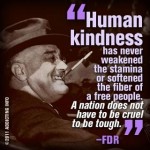I’m delighted to be guest posting at SmartBlog on Leadership so you’ll see this post there, too!
Employees complain in engagement surveys that their bosses don’t treat them with respect or as unique individuals. Yet on the flip side, research shows that bosses who treat people with kindness, respect and dignity are “seen as less powerful than other managers.”
What a dreadful paradox: We want to be treated with kindness yet don’t respect those who do so. What’s up with this?
In the workplace, kindness — being friendly, generous and considerate — is often dismissed as a weakness because of the negative stereotypes that cling to it: pushover, sucker, patsy or nice guy (or gal) who finishes last. Kindness isn’t typically rewarded at review time, given that most business performance is evaluated on what’s done rather than how it’s done.
Soft skills such as kindness lose their sizzle (if they ever had any) when compared with off-the-charts sales and other impressive bottom-line impacts delivered by the tough guys whose bad behavior often gets overlooked.
Because we see the it’s-all-about-me behaviors rewarded more generously than the we’re-all-in-this-together ones, “Managers see respect and power as two mutually exclusive avenues to influence, and many choose the latter,” says Batia Wiesenfeld, et al, in “Why Fair Bosses Fall Behind.” Nice is about me; kind is about you: So how does a character-based leader who wants to treat employees with dignity escape the paradox of the kindness hamster wheel?
Choose kindness over rudeness despite the personal cost. If you want to treat people kindly, then do so, fully aware that your choice can be costly. Research in the Journal of Personality and Social Psychology indicates that men who are agreeable earn less money per year (upward of $10,000) than those who opt to be disagreeable.
Commit to the Goldilocks principle of getting kindness just right. “Kindness, like many other traits, has an optimal level that makes it a virtue as opposed to a vice,” writes William Baker and Michael O’Malley in “Leading with Kindness.” Combining empathy with accountability is a skill set that no kind leader should be without.
Embrace a both/and approach to leadership. Truly kind and effective leaders understand they can both provide candid feedback and disagree with people, and leave others’ self-respect intact. Don’t confuse kindness with being likeable. Offering an alternative point of view doesn’t make you unkind.
Learn what power really is. From all the media accounts of power run amok, it’s gotten a bum rap of being all ego-centric and self-serving. Hooey. One can do well, show kindness and be as powerful as all get-out. Dare to be kind. Buck those kindness-as-weakness stereotypes and encourage those around you to do the same.
Break the cycle. Accept kindness from others without typecasting them as powerless. Flip the stereotype on its head by recognizing that those who treat you kindly are being truly powerful. They’ve courageously chosen to not follow the me-centered path.
The next time someone shows you respect, cares what you think or deals with you fairly — in short, treats you with kindness — don’t sell them or yourself short by presuming they’re without influence or smarts or power.
Image from The Sebourns
